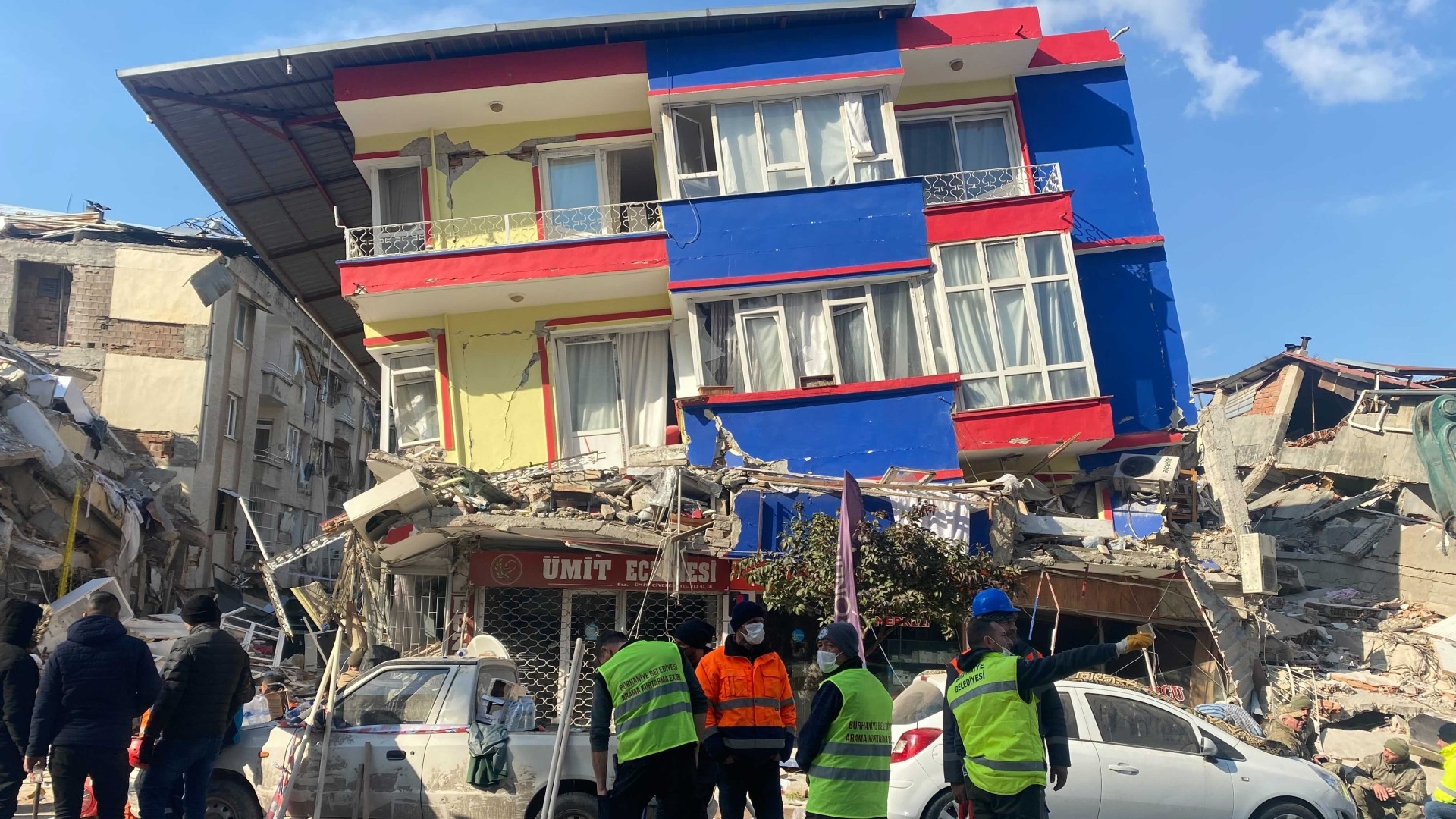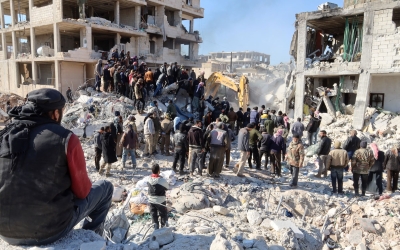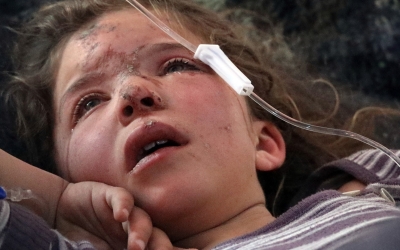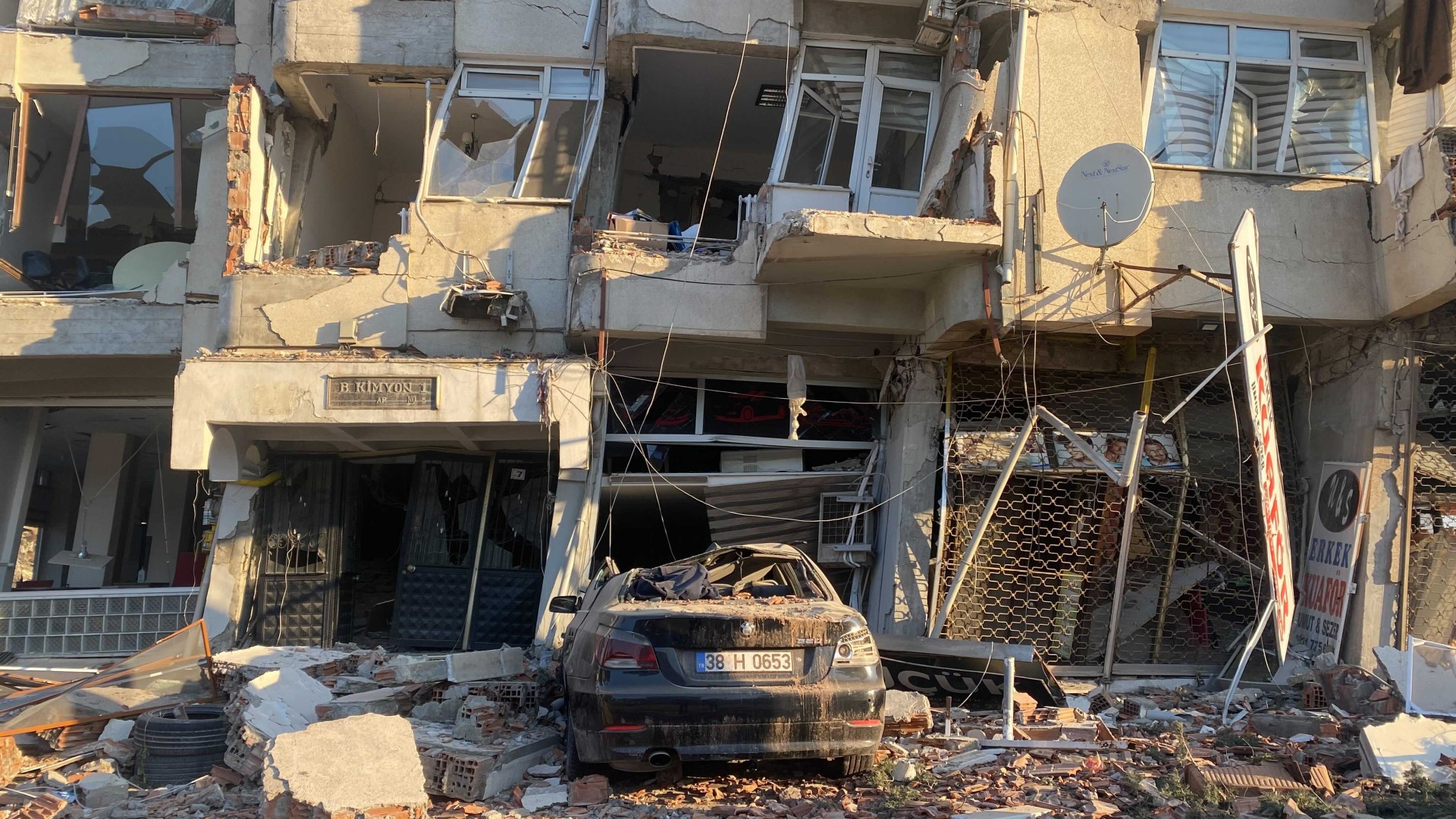Turkey earthquake: In Antakya, survivors stumble through city reduced to ruin

Heading to the Turkish city of Antakya, one of the areas worst hit by Monday's powerful earthquakes, the sheer scale of the disaster is overwhelming.
The road leading to this city of more than 200,000 people is gridlocked. Thousands of survivors poured onto the streets with the few remaining belongings they had in the hope of seeking safety elsewhere.
As emergency services and volunteer groups tried to make their way into this historic city, locals were packing their cars and heading in the opposite direction.
The closer we got, the more apparent the destruction appeared.
Men and children could be seen stumbling around in socks and sandals as they looked to find their loved ones.
New MEE newsletter: Jerusalem Dispatch
Sign up to get the latest insights and analysis on Israel-Palestine, alongside Turkey Unpacked and other MEE newsletters
Body bags lined the streets. Nearly every building was cracked or reduced to rubble. Trees had been cut down to burn and keep the displaced warm.
One family was hastily filling their van with as much water, bread and blankets as they could, as they rushed to make their way to relative safety in Iskenderun, a port town some 60km north of Antakya.
As we arrived in Antakya, following a car journey which should have been two hours but eventually lasted for seven, it was clear that there wasn't a coordinated response to the disaster.
Looking around, it was also apparent that no one was exempt.
Body bags lined the streets. Nearly every building was cracked or reduced to rubble. Trees had been cut down to burn to keep the displaced warm.
Rows of white tents and makeshift shelters were erected along the side of the road, revealing the epic scale of a disaster that has affected as many as 13 million people in Turkey and more than six million in Syria.
Odabasi, the bustling neighbourhood in the heart of the city, lay in complete darkness after power lines and the electricity grid were brought down by the twin quakes and hundreds of aftershocks.
Still, four days after the earthquakes struck, family members and emergency workers stood firm in the cold - digging away at the rubble in the hope of reaching trapped loved ones and survivors.
'Why did it happen?'
When one rescue team asked two Turkish and Syrian families for silence, a faint smile appeared on some of their faces as they thought cries of help could be heard.
But after a few minutes of defeaning silence it became apparent that their extended families, which comprised 10 people in total, had perished in the disaster.
What was so striking was that the building which stood opposite, which was constructed more than 50 years ago, was still standing whereas this building, which could not have been more than a few years old, was reduced to rubble.
"How did this happen to my beautiful homeland," Ferhan Kocaoglu, a volunteer rescuer, told Middle East Eye.
"Is it God who perpetuated this? Oh, no no! God doesn't punish us. But why did it happen?"
Nearby, a man was standing with a jerry can near a petrol station desperately asking for fuel.
"They are black marketing the oil," he exclaimed as he pleaded with passersby for help.
The fuel shortage has been compounded by people sleeping in their cars as many thought they would be warmer than in tents, while the amount of petrol people are allowed to buy has been limited.
A short distance away, a man vented his frustration over the lack of accessible toilets for both men and women.
"This place is like a jungle. Everybody is on his own," he said. "Piss wherever you can."
'We don't know what tomorrow will bring'
Amid the darkness, there was one noise that was constant - the incessant barking of dogs. With many domesticated animals hungry after having to fend for themselves these past few days, there were reports that some were beginning to turn violent.
"A dog attempted to attack me when my family and I were around the fire," Cemil, a local resident, told MEE.
"But we have nothing to give - we don't know what tomorrow will bring. Even a loaf of bread is important."
Cemil, who didn't give his last name, said he was was disappointed with the government's response to the disaster.
"The aid started coming on the third day. But some neighbourhoods receive more aid," he lamented.
"They [the government] fail to coordinate and distribute. Or, they ask us to go and collect whatever they are delivering. If I go by car, most roads are blocked. If I walk, how can I carry soup to my ailing parents?"
In some of Antakya's neighbourhoods it was clear that makeshift stations serving soup, bread and water had been set up. But elsewhere, in the suburbs, there was nothing.
As the hours passed and dawn broke, the sound of emergency sirens continued to ring out against the apocalyptic backdrop of the shattered city.
Situated between mountains and a river, Antakya was founded in 300 BCE by a former general in Alexander the Great's army. It has endured several devastating earthquakes in its history and now lies in ruins once more.
"Seventy percent of the houses have collapsed, 20 percent of them are badly damaged. Maybe, only 10 percent of them can be used again," Korhan Kaya, a volunteer from the western city of Izmir, told MEE.
"Since the second day of the earthquake, I [have been] here. I haven't seen such a thing, although I've taken part in many rescue operations in earthquakes elsewhere.
"The rubble is full of dead people. We fear the number of deaths will pass 50,000," he added.
'We have no hope'
In front of every levelled building, people could be seen waiting to extract the bodies of their loved ones, while the rows of black body bags, which were concealed hours earlier under the darkness of night, highlighted the enormity of the disaster.
But with many bodies crushed beyond recognition or scarred heavily by house fires, it was a difficult task to identify the remains that were being recovered.
"Who is the relative?" a rescuer shouted. "Come here and see if this is your relative," they added as they pointed out a dead body retrieved from the debris.
A woman sitting on a tiny chair in front of one of the collapsed building anxiously waited for someone to update her on the status of her family members, who were missing under the rubble and presumed dead.
"We have no hope that they'll come out alive. But at least, we don't want their corpses to be dismembered during the work of these machines," said Kaya, who was standing nearby and waiting for the bodies of her relatives to be retrieved.
"In the first and second day, there was no digger or whatever," she said, acknowledging that it had been almost impossible to bring multiple diggers or bulldozers to the city along with rescue teams following the disaster.
"Look at the buildings. They all collapsed. It could have been well organised. But this disaster is more terrible than people think," she added.
On a bridge stretching between the two sides of the city, a man was shouting: "Come, my friends, drink the soup. We have brought greetings from Afyon," referring to a city in Turkey's west which was hit by earthquakes in its past.
"We know what it is like to be homeless, to need even a cup of hot soup," he said while filling the cups for a rescue team from Mersin, a city close to Hatay.
The rescue team seemed exhausted.
"We saved some people. We could have saved more. But we didn't have the necessary equipment," one of them said.
At that time, another man came and hastily said: "We need three strong men to help us with delivering water to the villages."
Three members of the rescue team left their soups and ran to the truck.
Despite the solidarity, anti-Syrian sentiment was evident.
"Be careful with people, especially with Syrians," one Turkish man said as he passed by. "They are coming with minibuses, pretending to be victims, and stealing whatever they could."
The man next to him added: "Better to be careful with anyone. Many bad things are happening here," he said without giving further details.
While Antakya may have lost nearly everything, a semblance of community spirit still remained.
"We don't need more food here," one woman said. "They should send it to villages or other people who are in need."
Middle East Eye delivers independent and unrivalled coverage and analysis of the Middle East, North Africa and beyond. To learn more about republishing this content and the associated fees, please fill out this form. More about MEE can be found here.





